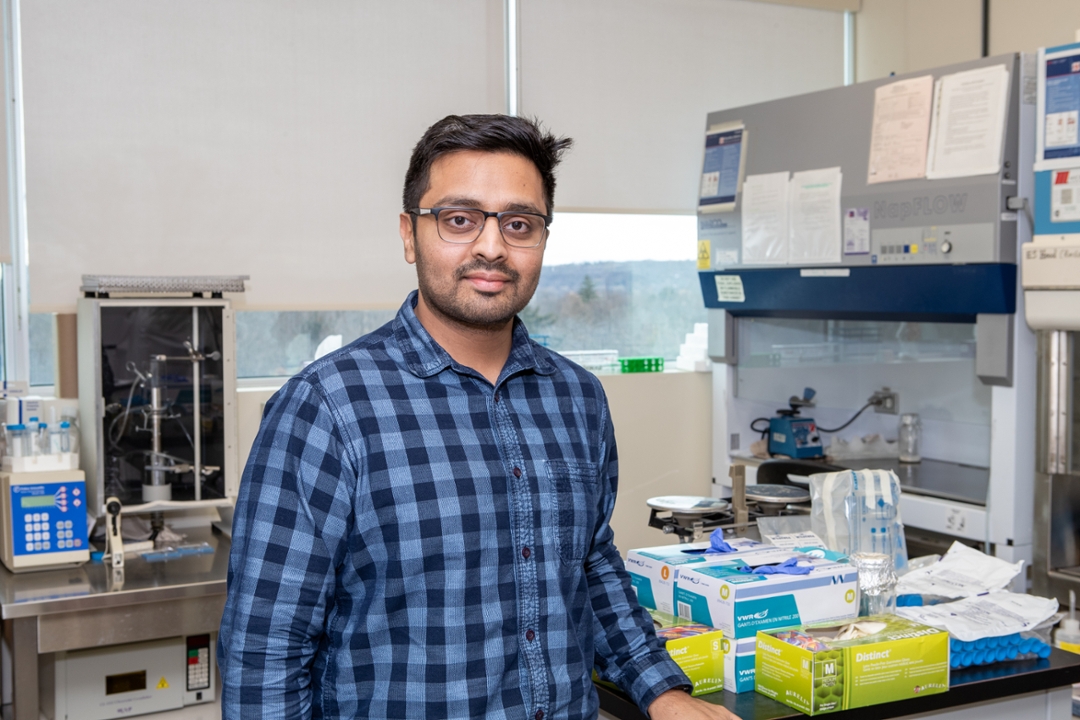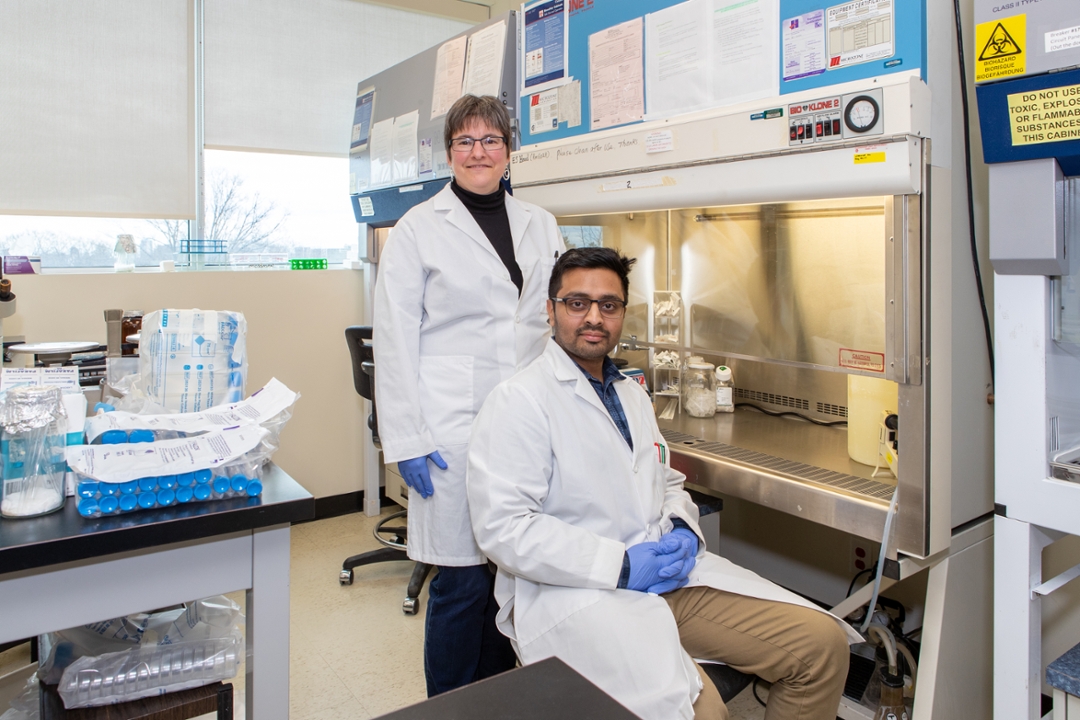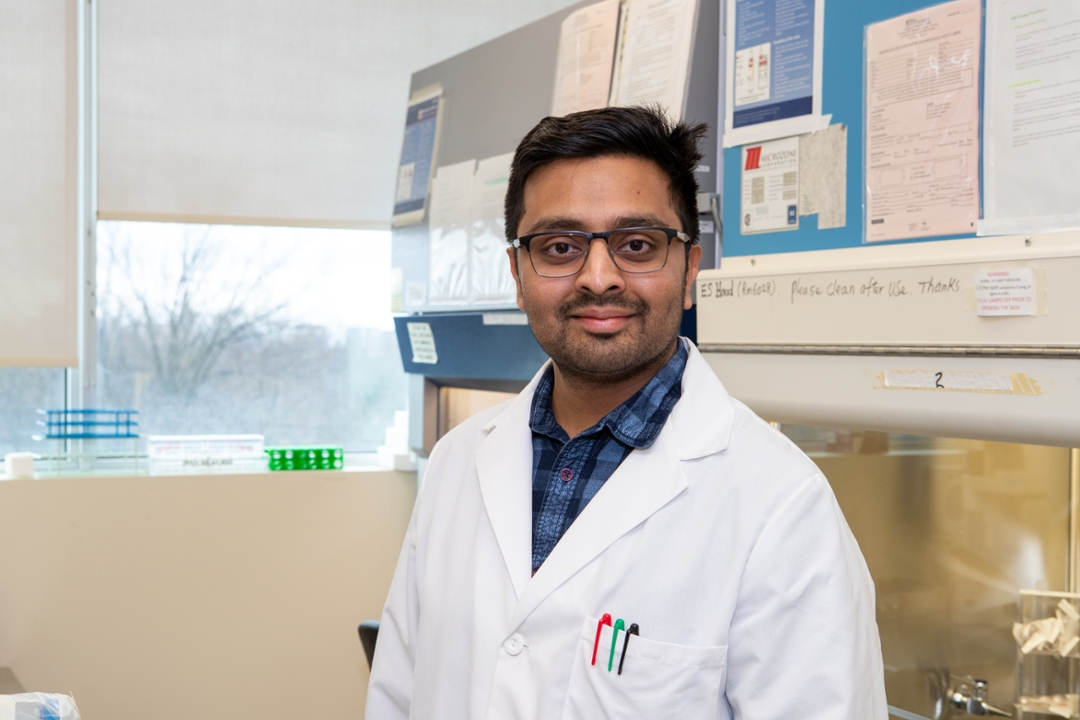
Time is of the essence
USask alumni works to understand human immunology amid crisis
By Naomi ZurevinskiFor Dr. Arinjay Banerjee (PhD’18), time is of the essence as scientists across Canada work towards understanding, treating and preventing the spread of COVID-19.
Since completing his PhD in veterinary microbiology at the Western College of Veterinary Medicine (WCVM) at the University of Saskatchewan (USask), Banerjee has been researching how human cells and bat cells respond to coronaviruses—work that has become even more pressing in the current COVID-19 pandemic.
“What I am doing right now is studying how the [COVID-19] virus interacts with the immune response. That is something that we think is very important to understand, because historically, coronaviruses that cause severe acute respiratory syndrome (SARS) and Middle East respiratory syndrome (MERS) can shut down human immune responses, and that’s why you have a bad disease prognosis and outcome,” Banerjee said.
“We want to establish that understanding for this virus and see if it is equally potent in shutting down human immune responses, or if the virus is less potent in shutting down immune responses. Either way, that’s going to be good information for researchers designing drugs and vaccines.”
Banerjee is currently a Natural Sciences and Engineering Research Council of Canada (NSERC) and Michael .G. DeGroote post-doctoral fellow at the Institute for Infectious Disease Research and McMaster Immunology Research Centre at McMaster University. When COVID-19 first broke out at the end of 2019, Banerjee happened to connect with Dr. Samira Mubareka (MD), a physician at Sunnybrook Health Sciences Centre in Toronto.
“Samira was sampling COVID-19 patients in Canada. We were on the phone, and I told her that I had done coronavirus work for my PhD. We discussed that we should culture the virus, which would help with all the diagnostics and vaccine studies,” he said.
In a matter of weeks, Banerjee was working with Mubareka’s team at Sunnybrook, trying to isolate the virus. In mid-March, the team successfully isolated and grew copies of the COVID-19 virus.
“Now, we’re taking it a step further to study it and understand it, in order to help people make vaccines and drugs for treatment,” Banerjee said.
“I’m based at McMaster in Hamilton, but I’m living in Toronto, Monday to Friday, to be able to work with the team. And I’m just one person; there are many other people who are commuting and staying away from their families, so they can help understand and control the outbreak.”
The work Banerjee is doing today has been an expansion on research he’s been doing for years. Originally from India, Banerjee completed his undergraduate degree at the University of Mumbai, followed by a master’s at the National Institute of Virology in India.
“While I was doing my master’s, I went to Berlin for a summer school on infectious diseases at the Max Planck Institute. Dr. Vikram Misra (PhD) was there from WCVM at the University of Saskatchewan. Vikram had a talk on bats, which I found fascinating. The Ebola outbreak had not happened yet, but was just starting, and so all of this got me very interested in bats and viruses,” he said.
As a result of the connection made, Banerjee moved to Saskatchewan and began studying human and bat cell responses to coronaviruses, under Misra’s supervision.
“As part of my PhD, I looked at the Middle East Respiratory Syndrome coronavirus (MERS) because I wanted to work with a virus that we think comes from bats and is a pathogen in humans,” he said. “We saw how it infects and replicates in human and bat cells, and we also saw how the human and bat cells can differentially mount an immune response against this coronavirus.”
Banerjee also worked with Dr. Darryl Falzarano (PhD) at USask’s Vaccine and Infectious Disease Organization – International Vaccine Centre (VIDO-InterVac), who trained him in the high containment lab so that he could conduct experiments. Falzarano also co-supervised his work on MERS coronavirus.
In the last two years of his PhD, Banerjee began to look at next steps for his research. He reached out to Dr. Karen Mossman (PhD), who is the acting vice-president research and an immunologist at McMaster University, about the possibility of working together.

“I knew this was a niche for myself and I wanted to continue studying bats and all of these viruses that spill over into humans,” he said. “McMaster has a unique bat colony that is maintained by researcher (Dr.) Paul Faure (PhD). So I reached out to Karen. I sent her a paper that was published from my PhD work and said, ‘Why don't you read this, and see if you find it interesting, and if you do, I’d like to get this science with me to McMaster University so I can develop it further with you.’ So she read the paper and thought it was fascinating.”
Banerjee applied for a number of grants and fellowships to obtain funding, and was awarded the Michael G. DeGroote Fellowship Award in Basic Biomedical Science from McMaster. He also received a postdoctoral fellowship funded by NSERC.
“My PhD was focused on virology and not as much on immunology. Now, I wanted to specialize in that. I think Karen, Vikram, Samira and I are all on the same wavelength; we’re people who get excited about interesting, fascinating science. I just love it,” he said.
Banerjee joined Mossman’s lab in fall 2018, after defending his PhD that August. He said a lot of his experiences at USask have shaped the work he’s doing now.
“I think the most critical thing I’d like to mention would be Vikram. From Day 1, he has trained me to go and seek out and say yes to opportunities. The other thing he also helped us do was to build our CV. It wasn’t just about publishing science, but he stressed the importance of communicating your science—go out and do presentations, talk at conferences, go to international meetings. All of this sets your CV up for success when you move on.”
At USask, Banerjee participated in many interdisciplinary experiences, like the Life and Health Sciences Research Expo, winning the Best Basic Science Paper in 2018, and the One Health initiative.

“I think reaching out to people in other silos was very important for me. One Health forced me to collaborate with other people, so I got to explain my science in a jargon-free and more accessible way,” he said.
“You don’t realize all of these skill sets that you’re acquiring as you go through your PhD, but I think one of the reasons I’m able to sit with physicians and understand them is because I’ve been doing this since my PhD. There are so many soft skills that you never give a second thought.”
With the current COVID-19 pandemic, Banerjee said it’s important to stay calm and follow guidance from the government and public health officials.
“Listen to the government, because when they’re telling you to self-isolate, there’s logic, reason, and experts behind these decisions,” he said.
“The world can be scary and I get that. I immigrated to Canada from a different continent, and now I call Canada my home. It was all scary and it still is, and every Sunday when I drive to Toronto to stay and work with new people, it gives me a lot of anxiety. But take that opportunity, take that step and say yes. You learn a lot out of it and almost certainly, I can tell you that you’re going to gain from it.”
Article re-posted on .
View original article.

